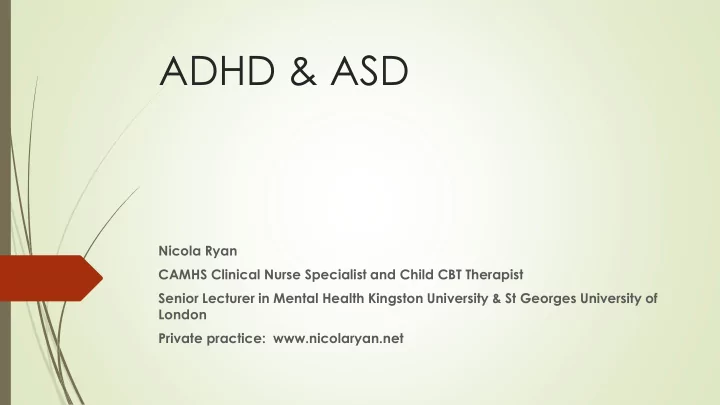

ADHD & ASD Nicola Ryan CAMHS Clinical Nurse Specialist and Child CBT Therapist Senior Lecturer in Mental Health Kingston University & St Georges University of London Private practice: www.nicolaryan.net
Some difficulties experienced in ASD & ADHD ADHD ASD ➢ Reciprocal social and emotion ➢ Attention to detail interaction ➢ Concentration & Listening ➢ Non verbal communication ➢ Following instructions & Organisation ➢ Developing and maintaining and understanding relationships ➢ Distraction and forgetting ➢ Repetitive movement, play and ➢ Fidgeting restlessness speech ➢ Noisy, excessive talking ➢ Routines and rituals ➢ On the go blurting out ➢ Fixed or obsessive interests ➢ Waiting turns, interrupting ➢ Sensory difficulties
Previous DSM 1V did not accept diagnosis of ASD & ADHD together ADHD & ASD This is because research has addressed the overlap of the two- ➢ Shared problems with communication and repetitive behaviours Clark et al 1999 and Santosh et al 2004 ➢ Neurophysiological similarities in structure of cerebellar Brieber et al 2007
The overlap: Those with both diagnosis have greater functional impairments ADHD with ASD ASD with ADHD ASD symptoms having more impact ADHD symptoms having more impact
The overlap Social skills ASD Language Executive Sensory Rigid and restrictive interests processing function ADHD Filtering and processing sensory information Attention Planning Organisation Inattention hyperactivity Creativity Hyperactivity Flexible thinking Impulsivity Inhibition Switching tasks
ASD & ADHD assessment Watchful waiting General developmental assessment ADOS 2 ADI/3DI Observation in clinic and at school Screening tools- Connor teacher and parent and self report Social Communication Questionnaire Misdiagnosis ADHD ASD Learning difficulty, Tourettes, tics disorder, anxiety, depression, hearing impairment, behavioural disorder, genetic conditions, brain injury
The mix up With an ADHD diagnosis social development such as turn taking, understanding gestures name recognition and creative play are intact. Facial expressions, humour and empathy are not affected. Kids with ADHD may struggle with social interaction and may not respond to their name but this can be due to impulsive behaviour, inability to take turns, not paying attention when someone is calling their name but they understand the concept for the above. In ADHD children may blurt out inappropriate things due to impulsivity and show remorse or embarrassment following this, children with ASD may not understand how what they say affects others and may show no remorse or understand the social impact.
In ASD children make not understand the concept of taking turns in conversation and conversation may not be reciprocal, may not respond to requests due to the inability to understand social rules. Children with ASD may become hyper stimulated to a particular environment/trigger and appear hyperactive, this behaviour may settle down when removed from the trigger. In ADHD the hyperactivity is more consistent and across settings. In ASD children my react out of proportion to the event, this is similar to emotion dysregulation in ADHD Treatment One disorder is treated and the symptoms of the other will then become clearer, then the right combination of therapy and medication can be calculated more accurately. Example: ADHD medication may be given and the social difficulties may start to subside, if this doesn’t happen but improves attention and hyperactive behaviours there may be underlying ASD.
Emotional regulation in ASD & ADHD Most children with ASD also experience a difficulty in regulating their emotions Evidence suggests that dysregulation of dopamine metabolism plays a role (Gadow 2014)
Support ASD ADHD Parent courses for ASD Parent courses for ADHD Family support worker Psycho education to child and school Adapted CBT or behavioural therapy for anxiety or depression CBT for emotion regulation or comorbid anxiety or depression Medication for anxiety or behavioural difficulties Family support worker Adapt the environment Stimulant medication routine/visual timetable, time out Adapt the environment , support place, consistency of approach, in school, reduce distraction, Control background noise social skills training, movement Develop social skills i.e. social breaks stories and communication skills, pecs, not using idioms, concrete language not open ended questions
Break (take 5)
Mental Health difficulties
Depression Present for at least 2 weeks Severe and persistent Flat affect (not showing range of emotion, difficult to identify in ASD but use what is normal as baseline) Tearful Physically slower Self neglect. Not washing or grooming self Poor appetite Disrupted sleep Self harm and or suicidal thinking
Anxiety General, (anxiety about lots of things regularly) Phobic specific situations(crowded spaces, social exposure to scrutiny or a single thing i.e. spiders) Panic reoccurring attacks of severe anxiety with physical symptoms may not be situation specific. What to look for? Sounds worried, needs reassurance and has anxious thoughts, especially at night affecting sleep. Tense, shaking,, agitation or over arousal, dry mouth, sweating, over breathing, panic
Anxiety continued OCD Insight is intact feeling that the thought is senseless and irrational and belongs to them Intrusive thought or images that cause distress i.e. contamination, switching things on or off, illness Resistance of thoughts or feelings which can increase anxiety Compulsions that are persistent and repetitive and can provide temporary relief If stereotyped rituals more common in ASD or there is absence of intrusive thoughts and is more to reduce feelings of discomfort/anxiety
When to get help The level of distress to the child or family Affecting the following: School performance or behaviour Peer relationships and activities Family relationships
Questions Resources ADHD & Autism: What Every Parent Should Know : A Parents Aid in Raising Their Children with ASD & Autism. Shelley Lewis The ADHD Autism Connection. Diane M Kennedy Kids in the syndrome mix ADHD, LD, ASD, Tourettes, Bipolar and more. . The one stop guide for parents, teachers and other professionals. Martin Kutscher MD Overcoming your child fears and worries: A Self Help Guide Using CBT techniques. Cathy Creswell Winston Wallaby Can’t Stop Bouncing K.I Al -Ghani The New Social Story Book Carol Gray Thankyou! www.nicolaryan.net
Recommend
More recommend